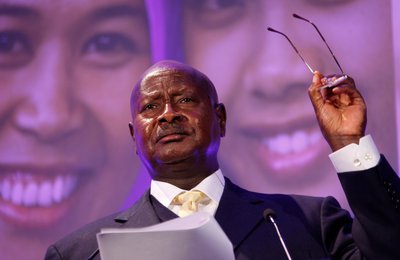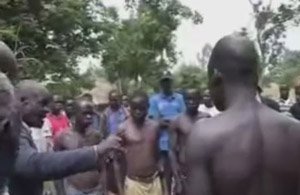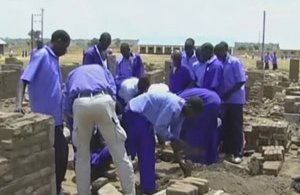Leaders of the rebel Lord’s Resistance Army (LRA) have allegedly written to the UN Secretary General to revive the stalled Ugandan-LRA peace process, in order to end the 24 years conflicts. Is this letter and request genuine? Are the LRA now committed to a peaceful and direct negotiation to end their rebellion? What challenges will the next phases of peace talks between the LRA and the current government of Uganda face; if talks are to resume, how credible will they be? According to the Ugandan government owned newspaper-the New Vision Monday 13, 2010, “in a September 6 letter, the LRA supporters asked the UN boss to take urgent steps to bring peace talks back on track.” The letter was signed by Justine Labeja who claimed to be acting leader of the LRA peace team.
Personally I believe that dialogue is the best way to end LRA hostilities and restore stability in LRA affected areas of the DRC, Southern Sudan and the Central African Republic. Past peace initiatives between the LRA and the Government of Uganda (GoU) paid more dividends than military operations, and even if such attempts failed to find a complete end to the insurgency, no single party can be entirely blamed for the failures. Is this the time to pick up the pieces and begin the needed first step in a long difficult journey to end the LRA conflict?
Background on the LRA
The Lord’s Resistance Army/Movement (LRA/M) insurgency has been ongoing for close to 24 years. This armed conflict initially started as a northern Ugandan popular local uprising against a perceived aggressive and revengeful victorious National Resistance Army/Movement (NRA/M). The rebels, and some government forces, due to their lack of civilian support, then turned their guns on innocent civilians. Many civilians were uprooted from their homes and dumped in internally displaced persons (IDP) camps, known as "protected villages". Since the mid-1990s and without local civilian support, the LRA has resorted to mass abduction and killings to replenish its quickly diminishing forces. Apart from occasional logistical support from the Khartoum government, and sanctuary in southern Sudan and now the jungles of the DR Congo, it is difficult to explain how the LRA movement led by Joseph Kony managed to survive for all these years and export its atrocities throughout the region. According to the Refugee Law Project, “at first glance, the persistence of the LRA over such a long period is incomprehensible: the majority of the force is made up of kidnapped children held against their will: the LRA is extremely unpopular among civilians because of its brutality and apparent lack of an overarching political agenda, and it operates in an environment without significant natural resources to sell for arms". Today it is 24 years and counting, with atrocities in Southern Sudan, the Democratic Republic of Congo (DRC) and the Central African Republic (CAR).
Past Attempts at Peace with the LRA
Since 1987, various attempts have been made to end the insurgency in northern Uganda, ranging from military strikes and operations, the offer of general amnesty, dialogue and negotiations. Ugandans witnessed military offensives like ‘Operation North’ (1991), ‘Operation Iron Fist I and II’ (2002 –2004/05), International Criminal Court (ICC) indictments and arrest warrants and ‘Operation Lightening Thunder’ (2008-2010). Several peace initiatives led by religious and cultural leaders, as well as national and international mediation efforts have failed. The latest examples were the Juba Peace Talks (2006-2008) and the Uganda, Sudan and Congo joint military attack ‘Operation Lightening Thunder’ (2008-2010), both described as unprecedented attempts to end the LRA insurgency.
The Juba talks had all the agenda items (Cessations of Hostilities - CoH; Comprehensive Solutions to the Conflict - CSC; Accountability and Reconciliation - AAR; Permanent Cease Fire - PCF; and Disarmament, Demobilisation and Reintegration - DDR) signed. It ushered in over five years of relative peace (2006-2010), although a Final Peace Agreement (FPA) was never signed. In 2008 and for the first time, the LRA came under a joint military attack involving four different countries in the region with support from the United States of America. However, the LRA eluded these attempts, left northern Uganda and instead established new frontiers, intensifying their atrocities in Southern Sudan, the eastern part of the DRC and the Central African Republic (CAR).
New Developments in the Peace Process
A lot has changed since then. A major obstacle during the Juba peace talks was the issue of ICC indictments. Despite several requests from the Ugandan government and civil society that the ICC suspend its warrants to help with the peace talks, ICC claimed Uganda must demonstrate its capacity to address crimes committed by the LRA. First it’s not only the LRA who committed crimes in northern Uganda and which must be dealt with in any credible justice pursuit. Second, Uganda has since adopted and domesticated the ICC Act and established a Special War Crimes Division (WCD) pursuant to the Agreement reached with the LRA in Juba in 2007. Also the ICC is coming under increasing fire from the African Union (AU) for its lack of acknowledgment and recognition of the dilemma of pursuing punitive justice in a conflict situation like the LRA.
These developments mean that if the LRA proposals are genuine they should be welcomed. There are now possibilities for dealing with some of the obstacles that frustrated the Juba Talks. The Juba talks ushered in a peace that had eluded northern Uganda for 20 years. The Obama administration passed an LRA Disarmament and Northern Uganda Recovery Act which prioritises civilian protection and peaceful or forceful resolution of the conflict. Operation Lightening Thunder failed miserably in protecting civilian lives and despite the success it achieved, thousands of innocent civilians became victims. The LRA Disarmament Act calls for a regional and comprehensive solution to the LRA conflict and this provides an unprecedented opportunity to once again re-engage with the LRA for a regional solution. However, it’s coming to election year in Uganda and politicians are busy plotting on how to rig or unleash violence to win elections. Which means the LRA issue will be overlooked as a distance threat. Yet in fact, the LRA, even though they are now operating in DRC, CAR or Southern Sudan should remain Uganda’s problems just like when they were in northern Uganda.
Should we then wait for elections before we resume any peace talks? The answer might be yes and no. 'Yes', given the lack of attention and possible changes in personality in the political change, but also 'no' because the LRA is a national, if not a regional problem, and what happens in Uganda’s political scene should not postpone its urgency. The army continues to fight despite ongoing elections and so much dialogue continues. It’s important to recognise the futility of military victory in ending the LRA insurgency comprehensively and addressing its root causes and reasons for continuity. A peaceful settlement on the other hand is cheaper and will help heal the deepening division created by this unending conflict. Will the AU add to the UN Security council a request for suspension of arrest warrants against LRA leaders if they resume credible peace talks like they did for President Bashir of Sudan? Will the ICC listen to the cries of victims of ongoing LRA violence in DRC, CAR and southern Sudan and pave the way for ending the conflict? Is the government of President Museveni ready to once more extent a genuine olive branch to the LRA?
These and many more are issues that must be addressed in renewed talks between the LRA and government of Uganda. The attack that followed the Juba peace talks undermined any little trust that could have existed between the LRA and President Museveni and his government and in any case there is need for an independent guarantor of any peace process. There next rounds of peace talks will be long and must also include direct and face to face meetings between LRA leader Joseph Kony and the President of Uganda.
Stephen Oola, Uganda Local Correspondent, 17 September 2010
[1] For more information on this period, I recommend the following paper by the Refugee Law Project: " Behind the Violence: Causes, Consequences and the Search for Solutions to the War in Northern Uganda". Working Paper No.11.2004






